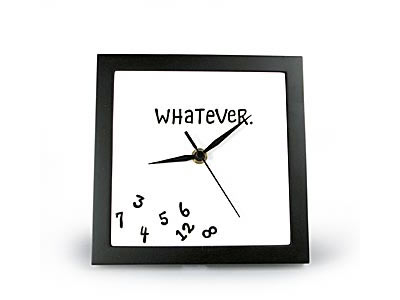I know, it's not Tuesday. But I was on vacation on Tuesday. So this week, Procrastinating 101 runs on Friday.
I've been looking forward to Chapter 9 of Marshall Cook's Slow Down . . . and Get More Done
Cook begins this chapter with a brief mention of the Hopi people, who have no word for tomorrow. He suggests that this is a linguistic artifact of their dwelling in the moment, in the present. That place I'm trying to find on my meditation cushion. He goes on to describe award-winning photographer Vern Arendt's ability to
immerse himself in the present, to suspend his sense of time and with it the urgent need to be someplace else, doing something else. . . . [to] lose himself in the moment, focusing completely on the task at handand how this capacity serves him in his work and his life.
Cook's next topic I think of as "watchlessness." He relates a Bulova Watch Company sponsored experiment in which people went without watches for two days and two nights, and the disorientation some experienced.
A few even said they didn't know whether they were hungry because they didn't know if it was "meal time."He writes, too, of a colleague's year without a watch, initially prompted by forgetting his watch one morning, and of his own several months unchained from this ubiquitous little time-keeper so many of us strap on each day to keep track of the hours and minutes we've "made up" to parse our days.
His discussion of the merits of going "timeless" reminded me of my undergraduate days, many suns and moons ago, when I refused to wear a watch for fear it would turn me into an automaton. I don't remember where I got the idea. Like many things I did during those relatively carefree years--like "smoking like a writer," and holding my coffee mug backwards in the manner of the character in Kazantzaki's Zorba the Greek
The rest of the chapter is a reflection on "the Timeless Zone." He wants us to think about occasions when we have become unhooked from time, have found ourselves so absorbed that we have "lost track" of its passage. He suggests that our life's most important memories have likely been made in this zone. He instructs us to recall in some detail our trips to the Timeless Zone, to see what circumstances they may have in common. And to ask ourselves how we might replicate those conditions.
I come away from Cook's observations more aware of my enslavement to our agreed-upon fabrication. Of course, we still have to rely on what Cook calls "Little Mind" to get us to appointments, to meet obligations, to, as Eliza Doolittle's father put it, "Get [Us] to the Church on Time." But Cook argues that arranging some timeless time, periods when relatively unbound, imaginative "Big Mind" can inspire us even to eat the roses, is restorative, and may help us to survive the journey.
This afternoon, I begin my 48 hours with a three-year-old. I am going to challenge myself to rely on his sense of time as much as possible. He doesn't own a watch.













No comments:
Post a Comment